Resume
IT Support Specialist Cover Letter Examples

May 29, 2025
|
12 min read
Boost your chances of landing that IT support specialist job with a cover letter that speaks volumes. Learn how to debug common writing errors while showcasing your skills and ensuring you're not 'left on read.'
4.70 Average rating
Rated by 348 people
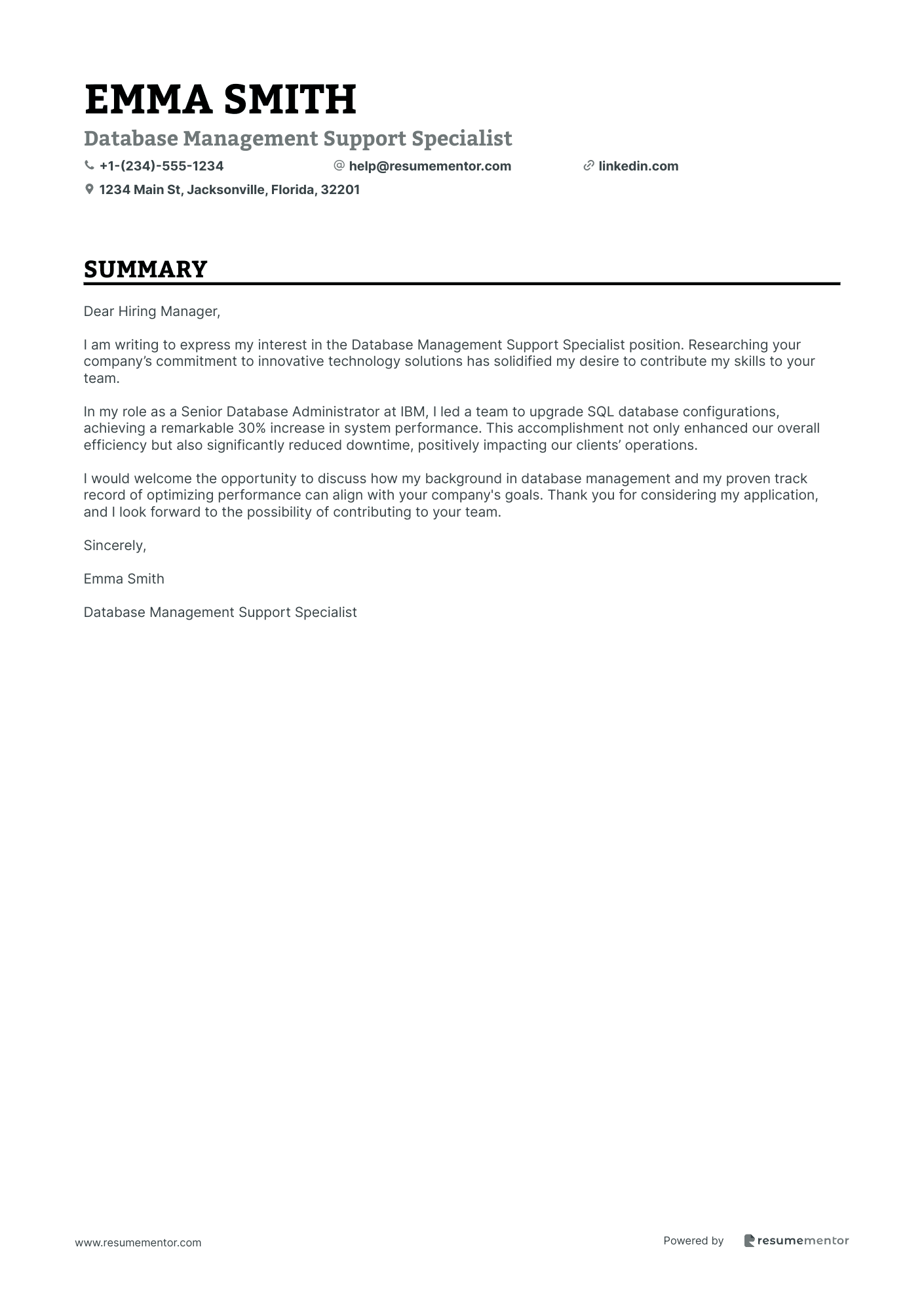
Database Management Support Specialist
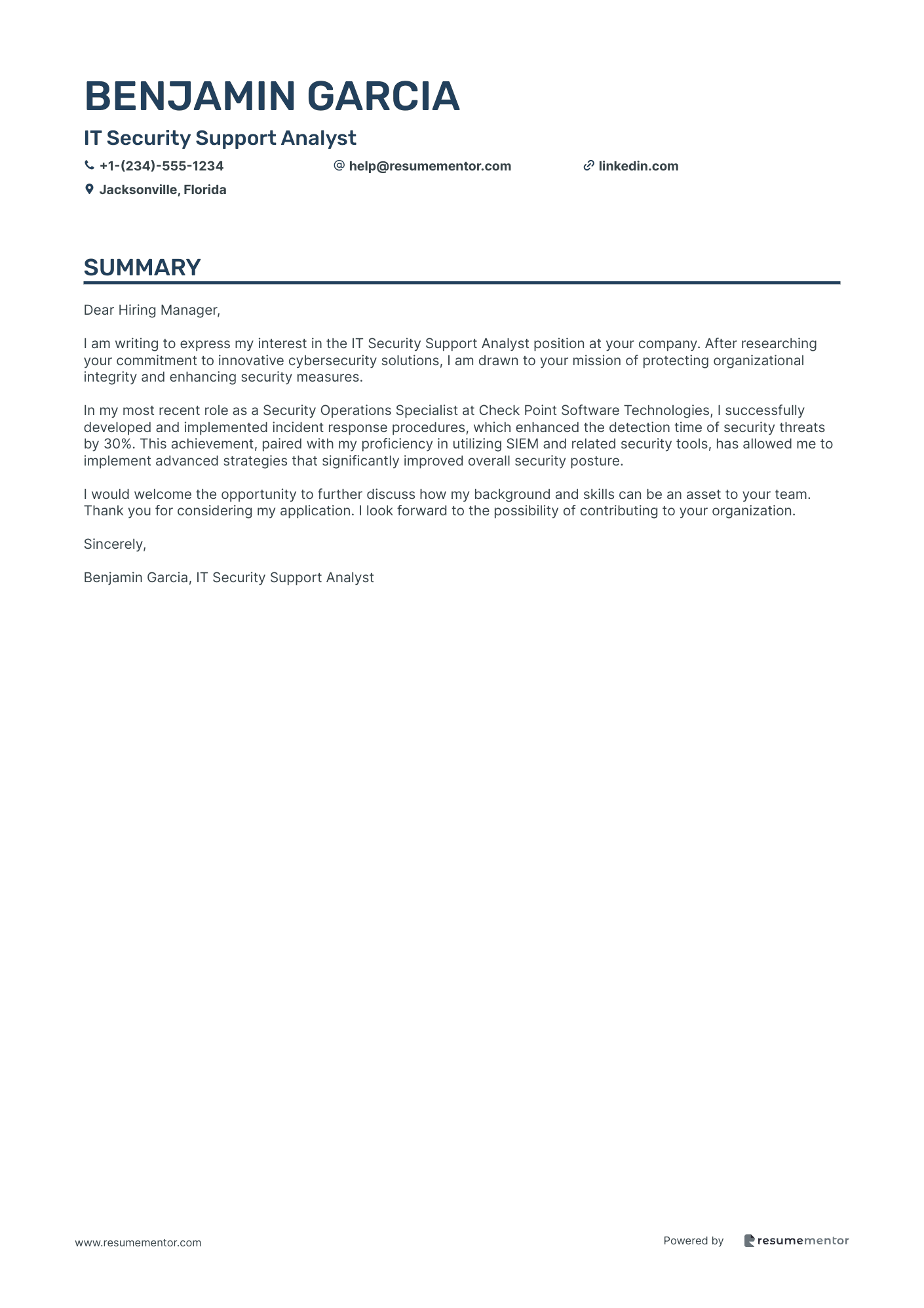
IT Security Support Analyst
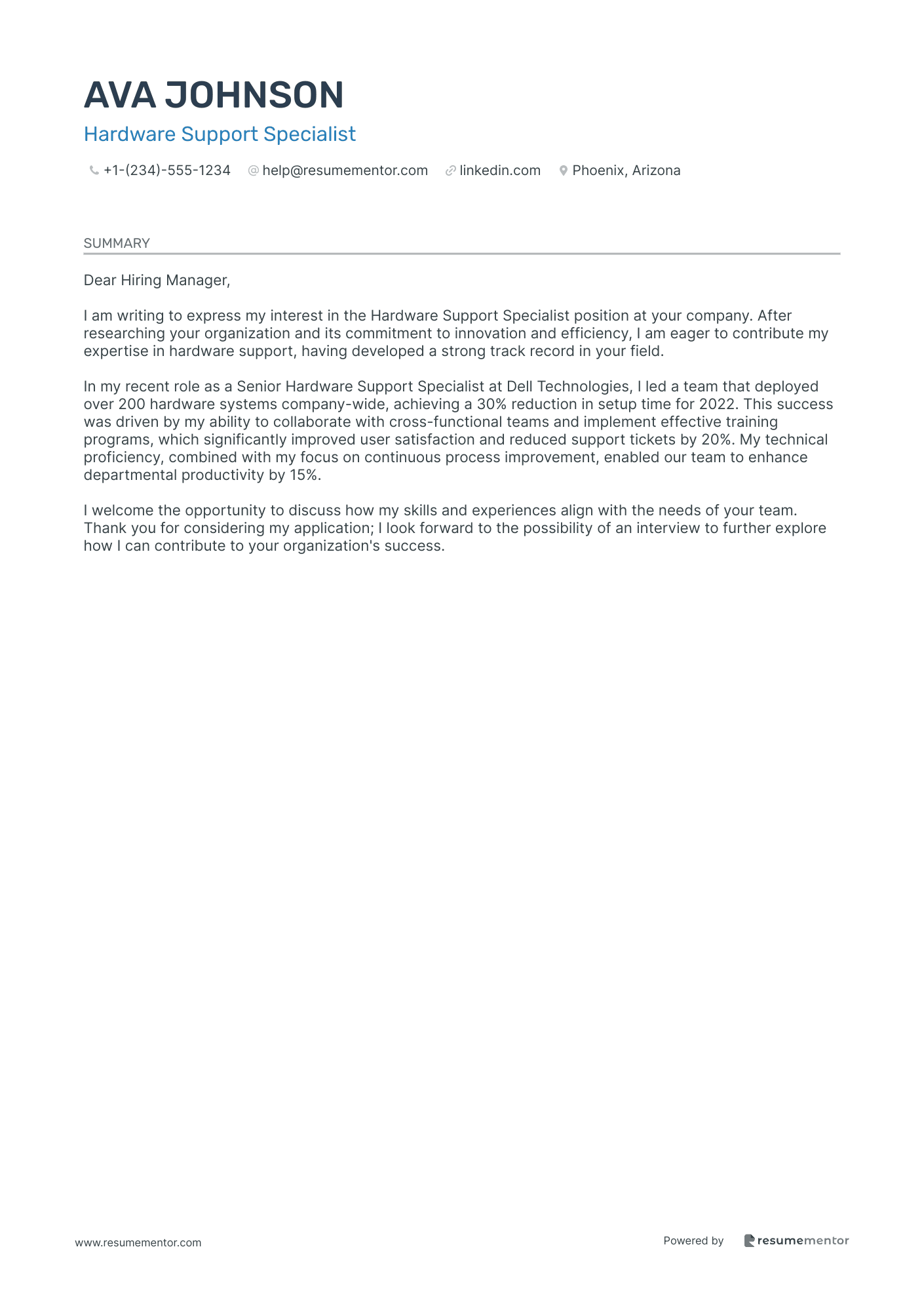
Hardware Support Specialist
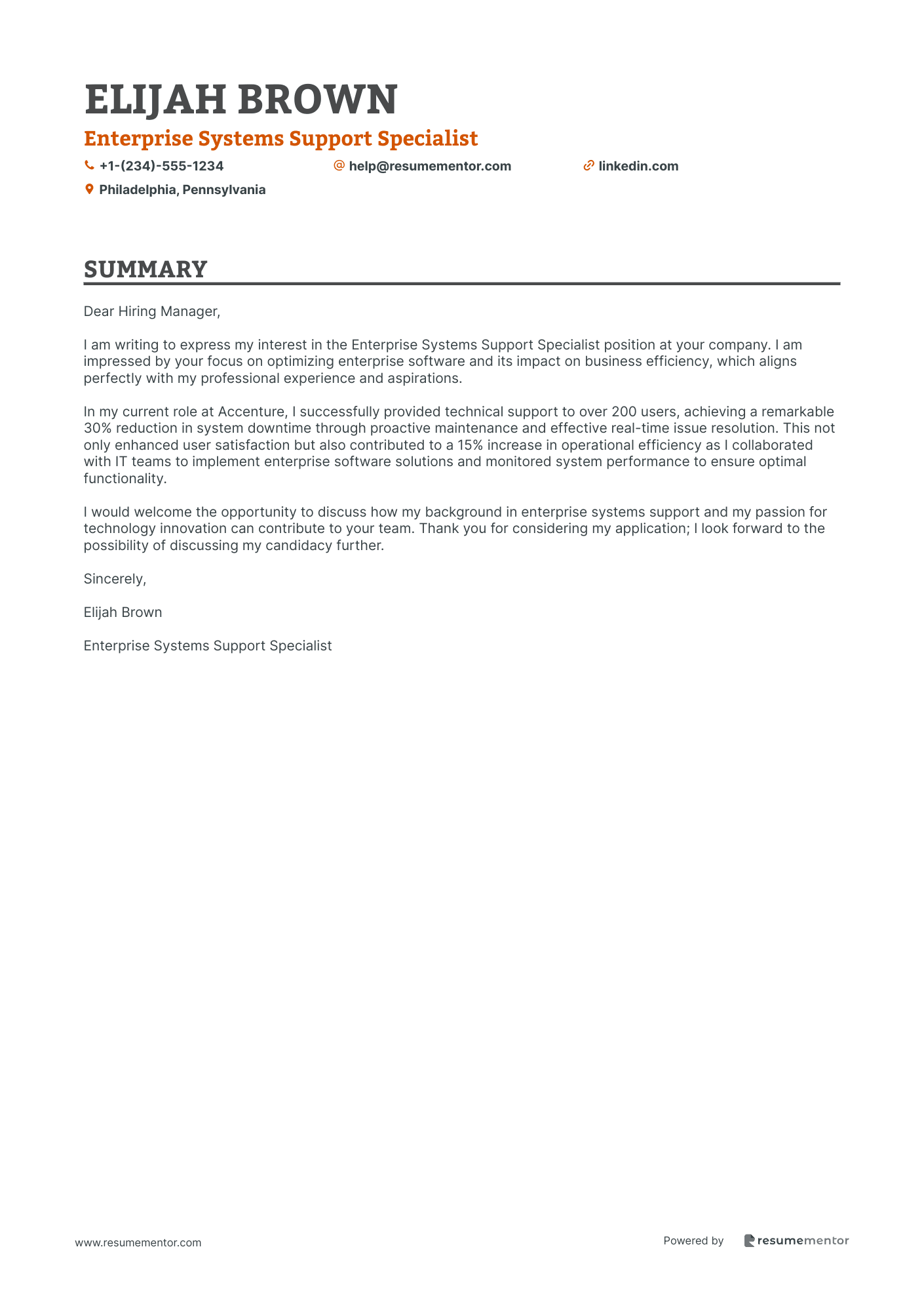
Enterprise Systems Support Specialist
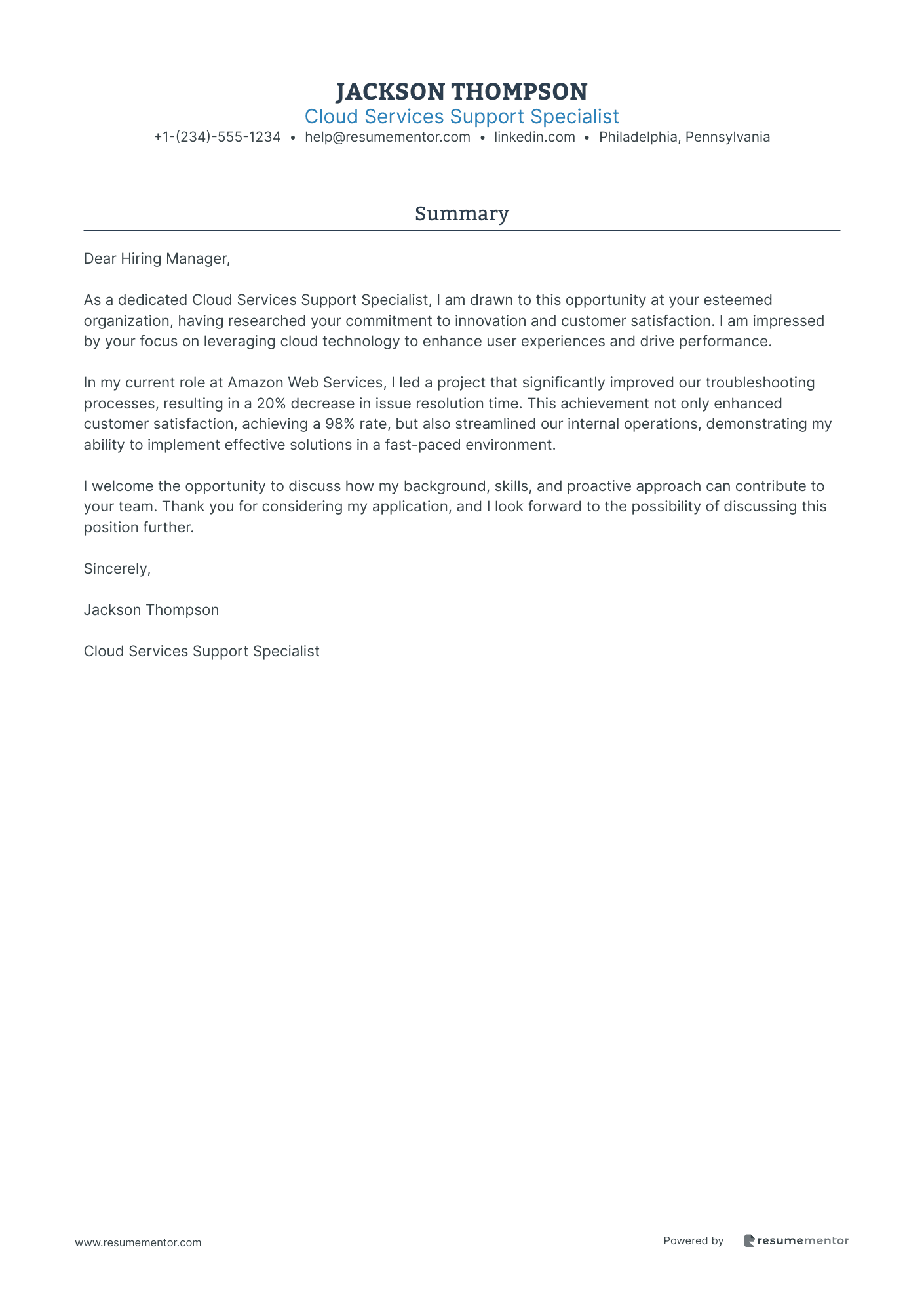
Cloud Services Support Specialist
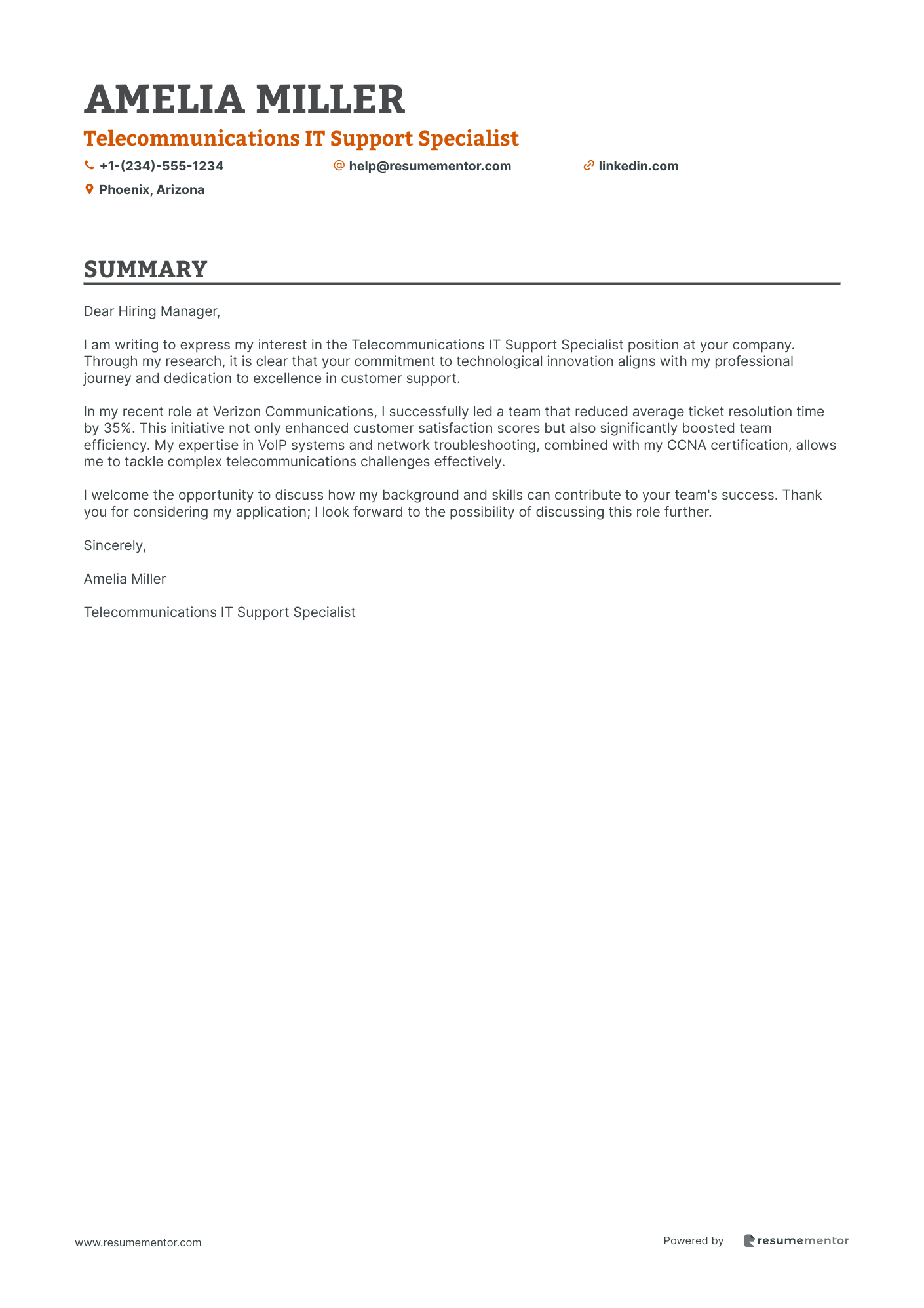
Telecommunications IT Support Specialist
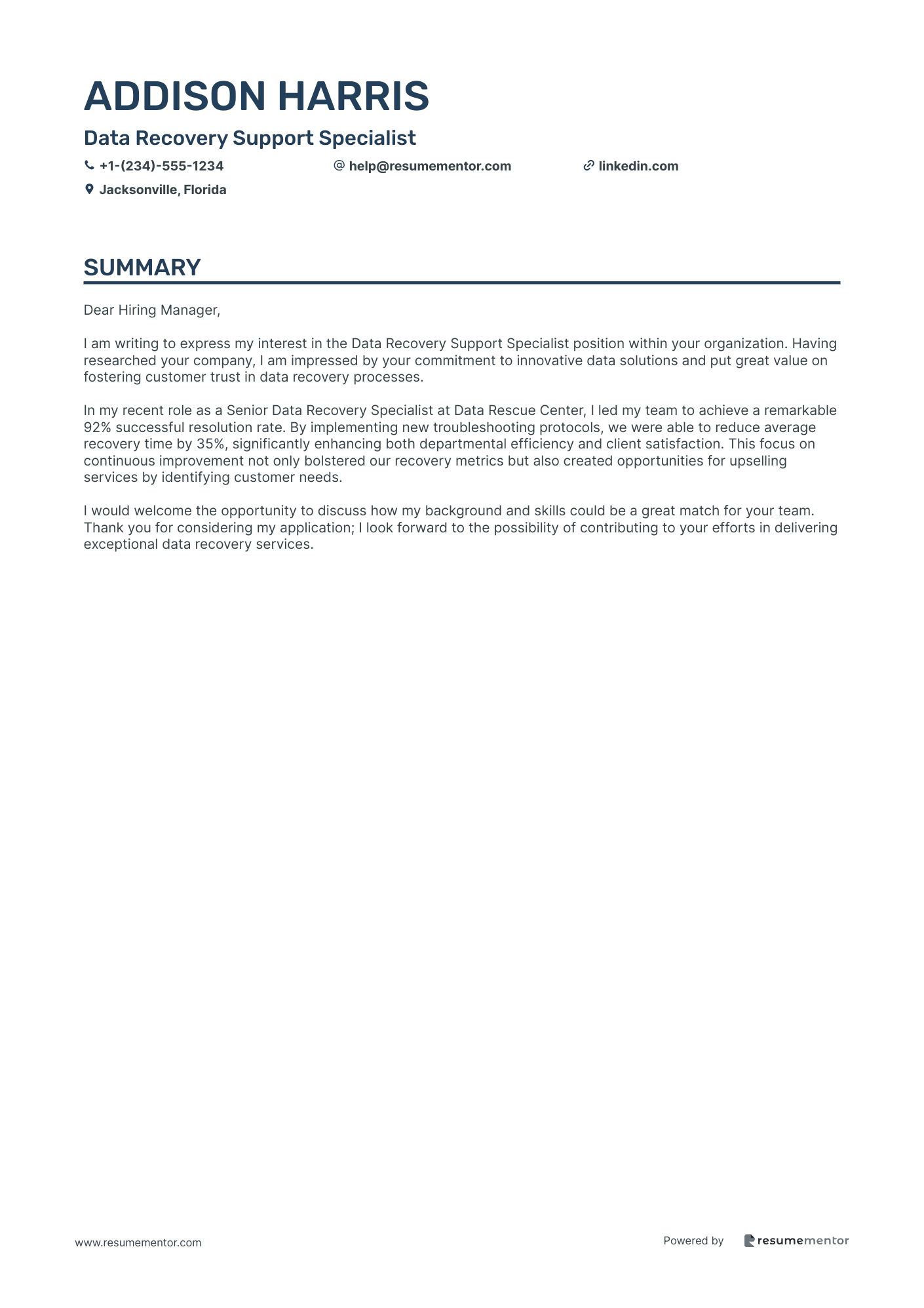
Data Recovery Support Specialist
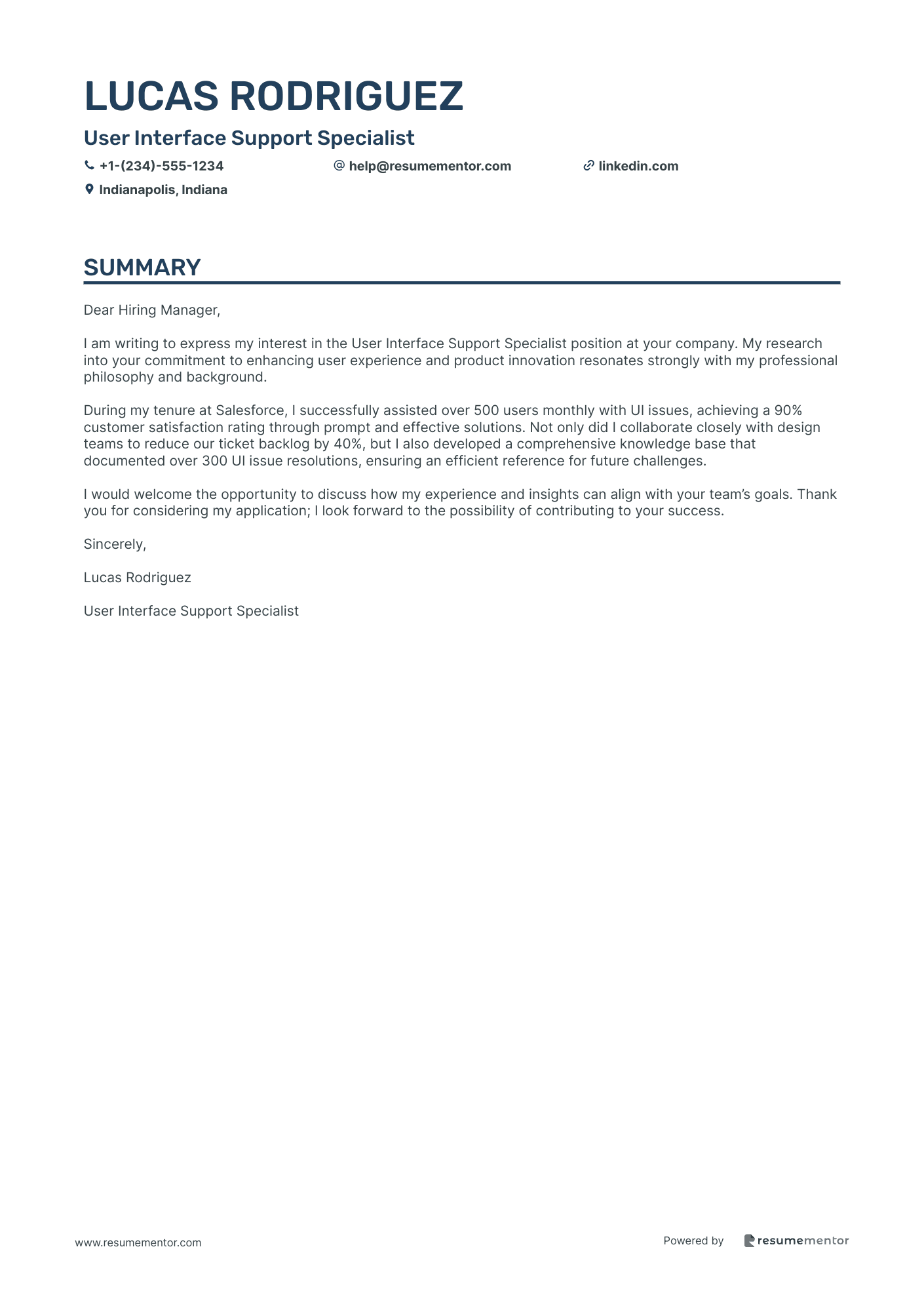
User Interface Support Specialist

Database Management Support Specialist cover letter sample
When applying for this position, emphasize your experience with database management systems and data entry accuracy. Highlight any skills in SQL or data visualization tools, as they are essential for managing large datasets. If you have completed any relevant courses or certifications, such as 'Database Fundamentals' or 'Data Analysis Techniques', mention these to showcase your commitment to professional growth. Include specific examples of how your attention to detail and analytical skills have improved data integrity or streamlined processes in previous roles, using a 'task-action-result' format.
Emma Smith
Database Management Support Specialist
Summary
Dear Hiring Manager,
I am writing to express my interest in the Database Management Support Specialist position. Researching your company’s commitment to innovative technology solutions has solidified my desire to contribute my skills to your team.
In my role as a Senior Database Administrator at IBM, I led a team to upgrade SQL database configurations, achieving a remarkable 30% increase in system performance. This accomplishment not only enhanced our overall efficiency but also significantly reduced downtime, positively impacting our clients’ operations.
I would welcome the opportunity to discuss how my background in database management and my proven track record of optimizing performance can align with your company's goals. Thank you for considering my application, and I look forward to the possibility of contributing to your team.
Sincerely,
Emma Smith
Database Management Support Specialist
IT Security Support Analyst cover letter sample
When applying for this position, highlight any experience with network security protocols and incident response. Demonstrating your knowledge of tools like firewalls, VPNs, and antivirus software is essential. If you have certifications such as CompTIA Security+ or Certified Information Systems Security Professional (CISSP), be sure to mention them and specify the duration of study. Include specific instances where your actions led to the prevention of security breaches or improved system integrity. Use clear metrics to showcase the impact your work has had on past organizations.
Benjamin Garcia
IT Security Support Analyst
Summary
Dear Hiring Manager,
I am writing to express my interest in the IT Security Support Analyst position at your company. After researching your commitment to innovative cybersecurity solutions, I am drawn to your mission of protecting organizational integrity and enhancing security measures.
In my most recent role as a Security Operations Specialist at Check Point Software Technologies, I successfully developed and implemented incident response procedures, which enhanced the detection time of security threats by 30%. This achievement, paired with my proficiency in utilizing SIEM and related security tools, has allowed me to implement advanced strategies that significantly improved overall security posture.
I would welcome the opportunity to further discuss how my background and skills can be an asset to your team. Thank you for considering my application. I look forward to the possibility of contributing to your organization.
Sincerely,
Benjamin Garcia, IT Security Support Analyst
Hardware Support Specialist cover letter sample
When crafting your cover letter, emphasize any technical expertise with hardware systems and troubleshooting skills. Highlight your experience with specific hardware components or systems, as well as any certifications like CompTIA A+ or similar. Include descriptions of how you've solved hardware issues efficiently and improved system performance. Use a 'skill-action-result' format to demonstrate your contributions, such as reducing downtime or enhancing user satisfaction. Show your ability to work in a team and communicate effectively with non-technical users to further strengthen your application.
Ava Johnson
Hardware Support Specialist
Summary
Dear Hiring Manager,
I am writing to express my interest in the Hardware Support Specialist position at your company. After researching your organization and its commitment to innovation and efficiency, I am eager to contribute my expertise in hardware support, having developed a strong track record in your field.
In my recent role as a Senior Hardware Support Specialist at Dell Technologies, I led a team that deployed over 200 hardware systems company-wide, achieving a 30% reduction in setup time for 2022. This success was driven by my ability to collaborate with cross-functional teams and implement effective training programs, which significantly improved user satisfaction and reduced support tickets by 20%. My technical proficiency, combined with my focus on continuous process improvement, enabled our team to enhance departmental productivity by 15%.
I welcome the opportunity to discuss how my skills and experiences align with the needs of your team. Thank you for considering my application; I look forward to the possibility of an interview to further explore how I can contribute to your organization's success.
Enterprise Systems Support Specialist cover letter sample
When applying for this position, emphasize your experience with enterprise software and systems. Highlight any troubleshooting expertise and your ability to resolve issues efficiently. Detail your proficiency in supporting various platforms, databases, or cloud services. Including relevant certifications like ITIL or Microsoft Azure can strengthen your application. Use specific examples where your interventions improved system performance or user satisfaction. Adopting a 'situation-action-result' format can illustrate your contributions clearly, showing potential employers the measurable impact of your skill set on previous projects.
Elijah Brown
Enterprise Systems Support Specialist
Summary
Dear Hiring Manager,
I am writing to express my interest in the Enterprise Systems Support Specialist position at your company. I am impressed by your focus on optimizing enterprise software and its impact on business efficiency, which aligns perfectly with my professional experience and aspirations.
In my current role at Accenture, I successfully provided technical support to over 200 users, achieving a remarkable 30% reduction in system downtime through proactive maintenance and effective real-time issue resolution. This not only enhanced user satisfaction but also contributed to a 15% increase in operational efficiency as I collaborated with IT teams to implement enterprise software solutions and monitored system performance to ensure optimal functionality.
I would welcome the opportunity to discuss how my background in enterprise systems support and my passion for technology innovation can contribute to your team. Thank you for considering my application; I look forward to the possibility of discussing my candidacy further.
Sincerely,
Elijah Brown
Enterprise Systems Support Specialist
Cloud Services Support Specialist cover letter sample
When crafting your cover letter, emphasize your technical proficiency with cloud platforms and tools. Detail any relevant certifications, such as AWS Certified Solutions Architect or Microsoft Certified: Azure Fundamentals, to establish your expertise. Highlight your experience in troubleshooting and resolving technical issues, showcasing specific examples where you improved service response times or customer satisfaction. Also, discuss your ability to work collaboratively with cross-functional teams, as effective communication is essential in this role. Use a clear structure to illustrate the challenges faced, actions taken, and results achieved.
Jackson Thompson
Cloud Services Support Specialist
Summary
Dear Hiring Manager,
As a dedicated Cloud Services Support Specialist, I am drawn to this opportunity at your esteemed organization, having researched your commitment to innovation and customer satisfaction. I am impressed by your focus on leveraging cloud technology to enhance user experiences and drive performance.
In my current role at Amazon Web Services, I led a project that significantly improved our troubleshooting processes, resulting in a 20% decrease in issue resolution time. This achievement not only enhanced customer satisfaction, achieving a 98% rate, but also streamlined our internal operations, demonstrating my ability to implement effective solutions in a fast-paced environment.
I welcome the opportunity to discuss how my background, skills, and proactive approach can contribute to your team. Thank you for considering my application, and I look forward to the possibility of discussing this position further.
Sincerely,
Jackson Thompson
Cloud Services Support Specialist
Telecommunications IT Support Specialist cover letter sample
When writing your cover letter, highlight any experience in technical support or telecommunications. Emphasize your problem-solving skills and patience when assisting users with issues. If you've completed certifications in networking or troubleshooting, be sure to include them along with the lengths of the programs. Use specific examples where your technical skills solved problems or improved system efficiency. This 'skill-action-result' method will demonstrate your ability to contribute effectively, making your application stand out to potential employers seeking reliable support staff.
Amelia Miller
Telecommunications IT Support Specialist
Summary
Dear Hiring Manager,
I am writing to express my interest in the Telecommunications IT Support Specialist position at your company. Through my research, it is clear that your commitment to technological innovation aligns with my professional journey and dedication to excellence in customer support.
In my recent role at Verizon Communications, I successfully led a team that reduced average ticket resolution time by 35%. This initiative not only enhanced customer satisfaction scores but also significantly boosted team efficiency. My expertise in VoIP systems and network troubleshooting, combined with my CCNA certification, allows me to tackle complex telecommunications challenges effectively.
I welcome the opportunity to discuss how my background and skills can contribute to your team's success. Thank you for considering my application; I look forward to the possibility of discussing this role further.
Sincerely,
Amelia Miller
Telecommunications IT Support Specialist
Data Recovery Support Specialist cover letter sample
When crafting your cover letter, it's essential to showcase any technical expertise in data recovery processes. Highlight experience with relevant software tools or technologies used in the industry. Strong problem-solving and analytical skills are critical, so share specific examples of how you've successfully recovered data in challenging situations. Mention any certifications, like 'Data Recovery Fundamentals', and specify the contexts in which you've applied your knowledge. Additionally, focus on teamwork experiences, demonstrating how collaboration led to successful project outcomes and satisfied clients.
Addison Harris
Data Recovery Support Specialist
Summary
Dear Hiring Manager,
I am writing to express my interest in the Data Recovery Support Specialist position within your organization. Having researched your company, I am impressed by your commitment to innovative data solutions and put great value on fostering customer trust in data recovery processes.
In my recent role as a Senior Data Recovery Specialist at Data Rescue Center, I led my team to achieve a remarkable 92% successful resolution rate. By implementing new troubleshooting protocols, we were able to reduce average recovery time by 35%, significantly enhancing both departmental efficiency and client satisfaction. This focus on continuous improvement not only bolstered our recovery metrics but also created opportunities for upselling services by identifying customer needs.
I would welcome the opportunity to discuss how my background and skills could be a great match for your team. Thank you for considering my application; I look forward to the possibility of contributing to your efforts in delivering exceptional data recovery services.
User Interface Support Specialist cover letter sample
When applying for this type of role, highlight any experience you have with troubleshooting and user support. Detail your familiarity with interface design principles and usability testing. Mention any relevant software skills, such as experience with design tools or ticketing systems. Showcase your ability to communicate technical information clearly to non-technical users. Provide specific examples of how your assistance improved user satisfaction or reduced response times. Use metrics where possible to demonstrate the impact of your efforts, following a clear 'challenge-action-result' format.
Lucas Rodriguez
User Interface Support Specialist
Summary
Dear Hiring Manager,
I am writing to express my interest in the User Interface Support Specialist position at your company. My research into your commitment to enhancing user experience and product innovation resonates strongly with my professional philosophy and background.
During my tenure at Salesforce, I successfully assisted over 500 users monthly with UI issues, achieving a 90% customer satisfaction rating through prompt and effective solutions. Not only did I collaborate closely with design teams to reduce our ticket backlog by 40%, but I also developed a comprehensive knowledge base that documented over 300 UI issue resolutions, ensuring an efficient reference for future challenges.
I would welcome the opportunity to discuss how my experience and insights can align with your team’s goals. Thank you for considering my application; I look forward to the possibility of contributing to your success.
Sincerely,
Lucas Rodriguez
User Interface Support Specialist
Related Articles

Continue Reading
Check more recommended readings to get the job of your dreams.
Resume
Resources
Tools
© 2026. All rights reserved.
Made with love by people who care.
